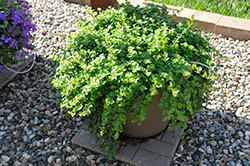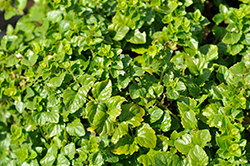It's all about ...
plants

Indian Mint
Satureja douglasii 'Indian Mint'
Height: 4 inches
Spread: 5 feet
Sunlight:
![]()
![]()
Hardiness Zone: 6b
Description:
A mint-like, evergreen trailing herb, producing a carpet of beautiful dark green, glossy, aromatic foliage; great for containers, and as a light shade groundcover; do not overwater
Ornamental Features
Indian Mint's attractive fragrant oval leaves emerge chartreuse in spring, turning dark green in colour the rest of the year on a plant with a spreading habit of growth.
Landscape Attributes
Indian Mint is a dense herbaceous evergreen perennial with a ground-hugging habit of growth. Its medium texture blends into the garden, but can always be balanced by a couple of finer or coarser plants for an effective composition.
This is a relatively low maintenance plant, and should not require much pruning, except when necessary, such as to remove dieback. It is a good choice for attracting bees and butterflies to your yard. It has no significant negative characteristics.
Indian Mint is recommended for the following landscape applications;
- Mass Planting
- General Garden Use
- Groundcover
- Herb Gardens
- Container Planting
- Hanging Baskets
Planting & Growing
Indian Mint will grow to be only 4 inches tall at maturity, with a spread of 5 feet. Its foliage tends to remain low and dense right to the ground. It grows at a fast rate, and under ideal conditions can be expected to live for approximately 5 years. As an evegreen perennial, this plant will typically keep its form and foliage year-round.
This plant does best in partial shade to shade. It prefers to grow in average to moist conditions, and shouldn't be allowed to dry out. It is not particular as to soil type or pH. It is somewhat tolerant of urban pollution. This is a selection of a native North American species.
Indian Mint is a fine choice for the garden, but it is also a good selection for planting in outdoor containers and hanging baskets. Because of its spreading habit of growth, it is ideally suited for use as a 'spiller' in the 'spiller-thriller-filler' container combination; plant it near the edges where it can spill gracefully over the pot. Note that when growing plants in outdoor containers and baskets, they may require more frequent waterings than they would in the yard or garden. Be aware that in our climate, most plants cannot be expected to survive the winter if left in containers outdoors, and this plant is no exception. Contact our experts for more information on how to protect it over the winter months.
This plant is not reliably hardy in our region, and certain restrictions may apply; contact the store for more information.

